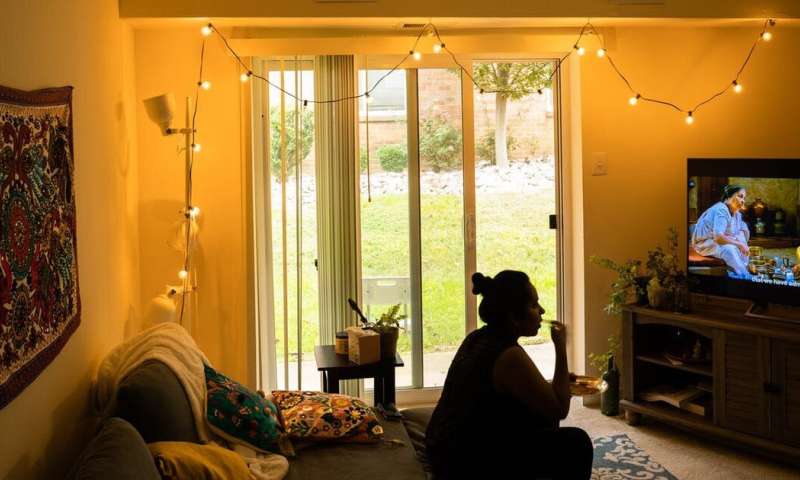
With the pressures of the holiday season, rising COVID-19 rates and the resulting social isolation from friends and family, people can easily fall into addictive or excessive behaviors. These are behaviors that are sometimes done to excess, taking on an addiction-like quality.
In your life, this might look like eating too many cookies or too much ice cream, a lot of online shopping (Amazon packages keep showing up!), too much screen time (binge-watching Netflix) or playing Minecraft or League of Legends all night long.
If you are wondering how to keep these habits in check, here are five strategies to help reduce excessive behaviors.
1. Investigate the behavior
Investigate the behaviors you deem to be excessive. The more details you have about the behavior, the more opportunities you have to interrupt it.
Examples of useful questions to ask include: When are you most likely to eat or drink more than you planned? Is it perhaps after a long day of work? Where does it happen—in the living room on the couch? Who else is involved? What do you typically eat or drink? How does it make you feel?
If you have someone in your life who loves gaming (playing video games) and may be spending too much time doing it, become curious about what it means to them. Ask what they love about gaming. They may enjoy it because it’s skills-based, or they achieve success in gaming, or because it’s team-oriented and social.
Ask how gaming makes them feel. For example, does it make them feel proud, energetic or disengaged from school? When are they most likely to do these behaviors for longer than planned (for example, at night)? Where do they do these behaviors (for example, in the bedroom)?
2. Recruit others for their good ideas!
Family members often have great ideas and insights when it comes to issues with excessive behaviors. For example, when it comes to gaming, young people often come up with great ideas around making a schedule and playing video games at certain times, or earning screen time.
We know from the research that most people recover from addiction and excessive behaviors with the help of a social network and from people close to them.
3. Experiment with place, time and objects
We know from research that context and place of casinos and drug use spaces invites excessive use. Context is important for other habits, too.
If out-of-control snacking happens on the couch during Netflix in the evening, restrict eating to only the kitchen. If someone is gaming until all hours of the night in the bedroom, limit gaming to the living room before 10 p.m. By changing the place and timing of behaviors, the practice itself ultimately changes—even just a little bit.
Marketing and consumerism have been implicated in the maintaining of addiction practices in junk food, gambling and video games. The developers of these products want people to continue to use them, and design them to keep people hooked. Video games are designed to require many hours to pass to the next challenge. Apps have bells and whistles (likes, messages and comments) that reward and entice users for more engagement.
In the world of gambling, this looks like games designed for near-miss features, speed of play and illusion of control. These features increase gaming productivity to accelerate play, extend duration and increase amount of money spent.
In fact, former technologists from Silicon Valley who created the “addictive” technologies used in social media are now warning of potential tech addiction and corresponding negative effects.
Investigate the objects that are important to the behavior you want to reduce. Some folks find removing apps on their phones is helpful, taking gaming holidays, designing a cellphone hotel in the kitchen (a place where the cellphones stay), limiting video game and social media use to common areas or turning off internet by 10 p.m. each night
4. Pay attention to what you think and say
How we talk about excessive behaviors and what we say about them to ourselves and others matters. If we talk about ourselves or other people (such as our partners or kids) as “addicted” to something, like video games, it’s easy for them to live up to that reputation—almost defining who they are. Addiction and the words we use are tied to our identities and the ways we see ourselves and others.
Telling your teen they are addicted to gaming and making them stop cold turkey won’t likely be helpful, and may elicit unwanted responses. To avoid anger, protest and sneaky behavior, invite your teens into the decision-making.
Consider the things you say to yourself when you engage in excessive behaviors. Do you catch yourself thinking, “I need this drink to relax” or doing X “provides me with me time?” Any “should” or “shouldn’t” type language might be setting yourself up for failure.
Instead, avoid “shoulds,” extremes or black-and-white thinking. Live in the gray area, have kindness and compassion for yourself and others. Experiment with new ways of talking to yourself (and others) during your daily life.
5. Experiment with other activities
Are there other activities that help you relax, beyond mulled wine and cookies?
What happens if you make a tea and go for an evening walk instead of snacking and turning on Netflix? Other ideas to try could be a game of cards, games night, puzzles, dance parties in the kitchen, scavenger hunts in the neighborhood (counting reindeer or inflatable figures), family karaoke night or themed evenings.
Perhaps you want to imagine visiting Mexico for the night, complete with nachos, mocktails, dancing to mariachi music on YouTube, and wearing shorts and a T-shirt. You might consider someone’s favorite video game or character and create a party around that theme.
Source: Read Full Article